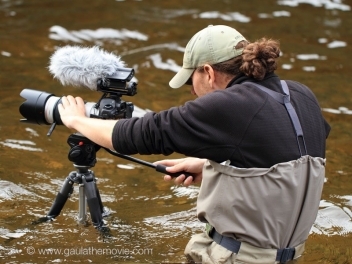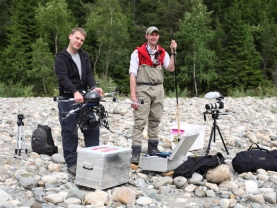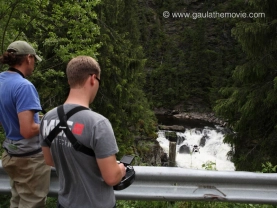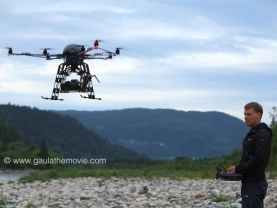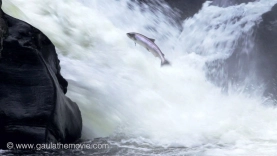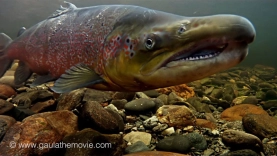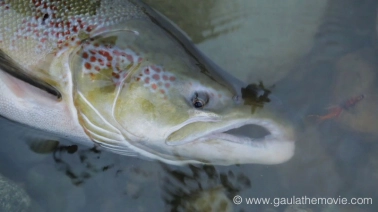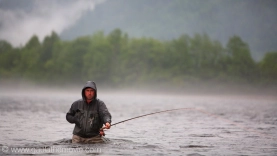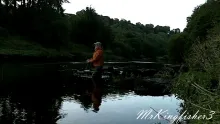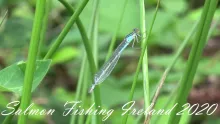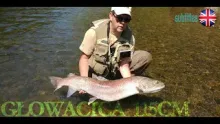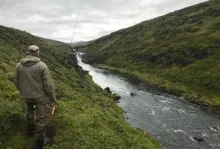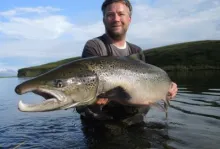Coming from the hands of one part of the pair behind the fabulous video Tâpam - Daniel Göz - this time teaming up with fellow countryman Anton Hamacher, we thought it would be suitable to contact the duo and inquire about the background and process of making the video Gaula - River of Silver & Gold.
We have just reviewed the video Gaula,- River of Silver & Gold which documents the fishing in the famous Norwegian river and tells about the problems it (and most Norwegian rivers) face in the form of dams, fish farms, diseases, fish lice and much more.
Coming from the hands of one part of the pair behind the fabulous video Tapâm - Daniel Göz - this time teaming up with fellow countryman Anton Hamacher, we thought it would be suitable to contact the duo and inquire about the background and process of making the video.
Tell us about the background for doing "Gaula". Your own interest in salmon fishing? A special relation to this particular river or Norway? An opportunity or impulse to go there?
Daniel:
I was working on the River Gaula for the Norwegian Flyfisher's Club during the early 2010 season doing extensive stills work. The Gaula is an absolutely fascinating river and so are the salmon! Jan and I had completed the production of Tapâm, Manfred Raguse loved the film and asked me if I would like to do a film on the Gaula. I was immediately hooked. This gave me the chance to do something totally different from Tapâm.
You chosen to go with a more "traditional" documentary style with interviews and a scripted narrator - even the music is more traditional. Why this change compared to the much more personal Tapâm style?
Anton:
For centuries fishermen have been obsessed with trying to catch Atlantic salmon on the fly. Since Atlantic salmon stop feeding after entering freshwater this seems to be one of the last sensible things to try.
We recognized that there is much more to it - something hard to describe in words - that makes fishermen chase this special silvery fish every year when it returns to the river. For people who are not into fishing, and even for those of us who are, it is sometimes hard to really understand why we are doing what we are doing.
The beauty of the Gaula river system, its inhabitants and the landscape gave us the perfect background to show and understand what makes fly-fishing so fascinating.
The rather traditional approach in a documentary style opens for more opportunities to share this experience with a wider range of people and to visualize our passion to those who are not into fishing.
We as fishermen have some influence on the river systems we are fishing in - so we also have the power to preserve them. We should do everything to protect them for the future.
It seems like you did a lot of preparation for "Gaula". Or did you? Was it meticulously planned, scripted and story boarded, or done more on what the circumstances offered?
Daniel:
Every film we have done was meticulously planned. This is the backbone of every film. You must come and work well prepared. This includes technical aspects of the shoot but also the script and storyboard.
Yet, when you're in the field all the preparation becomes a rough guideline. There are always twists and turns that come as a surprise. This is when making the most and best of the situation becomes so important.
Tell us about the chopper shots and the setup.
Anton:
At a very early stage of pre-production, we wanted to have the best possible aerial filming to show the beauty of the Gaula Valley. Luckily Andreas Büttner, a very good friend of ours, is one of two experts in Germany on this. He was willing to come to Norway and work for us. He builds custom made "octocopters" which are basically remote controlled helicopters with 8 small blades under which the camera is suspended. This air-borne solution can fly like no real helicopter can: the octocopter (operated by two) flew down tight gorges or 50 cm above the water level. We created some unreal shots with Andy's octocopter.
What about the underwater shots?
Daniel:
If you want to understand the river Gaula and the fish you have to go underwater. We have put tremendous efforts into this and it paid off.
We knew that filming the fish during spawning season would be extremely challenging, this actually turned out to be the most difficult shoot I have ever done. Placing a large underwater camera housing in the river at freezing temperatures isn't for everyone. All the hard work was well worth it. I was able to capture very rare aspects and spawning behaviors of large Atlantic salmon in great technical quality. I am very happy with the result.
How has "Gaula" been received by the audience?
Anton:
The film has been very well received by the audience. We have received many emails in which people say they love the combination of a documentary and flyfishing film.
Many also seem to be a bit fed up with "fish porn". Gaula fits perfectly into this. Many salmon flyfisherman mentioned that the film perfectly describes the essence of flyfishing for Atlantic salmon. This is a great compliment.
Another great compliment is that many that do not flyfish at all also like the film.
I notice from our correspondence that you have been traveling quite a bit, and that BBC and AP was mentioned... What's next?
Daniel:
I have spent very little time at my base in Frankfurt. I have indeed been working several weeks for a large Animal Planet format. At this stage I'm not allowed to tell you precisely what that is. I will keep you posted for sure, though.
Facts
More about the film Gaula - River of Silver and Gold on the web site made for the film. You can also buy the DVD or Blu-ray disc on the site.
A preview of the video
Daniel Göz' web site
Our review of the DVD
- Log in to post comments

